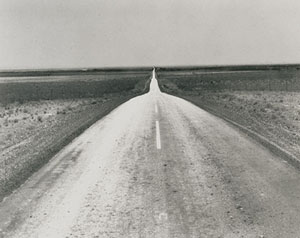 |
|
| Questions for Teaching |
• List everything you see in this picture. |
Background Information |
Lange's subject in this photograph is the road, specifically, the seemingly endless Highway 54 as it cuts through the vast New Mexican desert. The road dominates her vision of the southwestern landscape—the land flanking the road has only dry patches of grass and small shrubs, and the sky is empty. Although a road suggests a driver and passengers traveling by car, no people are seen in this picture. Nonetheless, because Lange must have been standing on the road to take this picture, we have a sense of traveling on the road ourselves. |